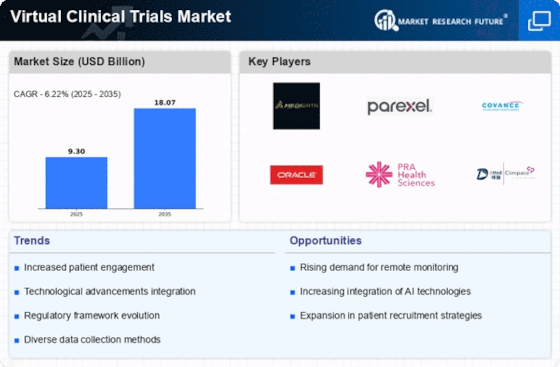Interventional Trials
Observational Trials
Registry Trials
Diagnostic Trials
Wearable Technology
Mobile Health Applications
Telemedicine Platforms
Blockchain Technology
Oncology
Cardiology
Neurology
Infectious Diseases
Endocrinology
Direct to Patient
Doctor Referrals
Online Platforms
Patient Registries
North America
Europe
South America
Asia Pacific
Middle East and Africa
North America Outlook (USD Billion, 2019-2035)
Virtual Clinical Trials Market by Study Design Type
Interventional Trials
Observational Trials
Registry Trials
Diagnostic Trials
Virtual Clinical Trials Market by Technology Type
Wearable Technology
Mobile Health Applications
Telemedicine Platforms
Blockchain Technology
Virtual Clinical Trials Market by Therapeutic Area Type
Oncology
Cardiology
Neurology
Infectious Diseases
Endocrinology
Virtual Clinical Trials Market by Participant Recruitment Type
Direct to Patient
Doctor Referrals
Online Platforms
Patient Registries
Virtual Clinical Trials Market by Regional Type
US
Canada
US Outlook (USD Billion, 2019-2035)
Virtual Clinical Trials Market by Study Design Type
Interventional Trials
Observational Trials
Registry Trials
Diagnostic Trials
Virtual Clinical Trials Market by Technology Type
Wearable Technology
Mobile Health Applications
Telemedicine Platforms
Blockchain Technology
Virtual Clinical Trials Market by Therapeutic Area Type
Oncology
Cardiology
Neurology
Infectious Diseases
Endocrinology
Virtual Clinical Trials Market by Participant Recruitment Type
Direct to Patient
Doctor Referrals
Online Platforms
Patient Registries
CANADA Outlook (USD Billion, 2019-2035)
Virtual Clinical Trials Market by Study Design Type
Interventional Trials
Observational Trials
Registry Trials
Diagnostic Trials
Virtual Clinical Trials Market by Technology Type
Wearable Technology
Mobile Health Applications
Telemedicine Platforms
Blockchain Technology
Virtual Clinical Trials Market by Therapeutic Area Type
Oncology
Cardiology
Neurology
Infectious Diseases
Endocrinology
Virtual Clinical Trials Market by Participant Recruitment Type
Direct to Patient
Doctor Referrals
Online Platforms
Patient Registries
Europe Outlook (USD Billion, 2019-2035)
Virtual Clinical Trials Market by Study Design Type
Interventional Trials
Observational Trials
Registry Trials
Diagnostic Trials
Virtual Clinical Trials Market by Technology Type
Wearable Technology
Mobile Health Applications
Telemedicine Platforms
Blockchain Technology
Virtual Clinical Trials Market by Therapeutic Area Type
Oncology
Cardiology
Neurology
Infectious Diseases
Endocrinology
Virtual Clinical Trials Market by Participant Recruitment Type
Direct to Patient
Doctor Referrals
Online Platforms
Patient Registries
Virtual Clinical Trials Market by Regional Type
Germany
UK
France
Russia
Italy
Spain
Rest of Europe
GERMANY Outlook (USD Billion, 2019-2035)
Virtual Clinical Trials Market by Study Design Type
Interventional Trials
Observational Trials
Registry Trials
Diagnostic Trials
Virtual Clinical Trials Market by Technology Type
Wearable Technology
Mobile Health Applications
Telemedicine Platforms
Blockchain Technology
Virtual Clinical Trials Market by Therapeutic Area Type
Oncology
Cardiology
Neurology
Infectious Diseases
Endocrinology
Virtual Clinical Trials Market by Participant Recruitment Type
Direct to Patient
Doctor Referrals
Online Platforms
Patient Registries
UK Outlook (USD Billion, 2019-2035)
Virtual Clinical Trials Market by Study Design Type
Interventional Trials
Observational Trials
Registry Trials
Diagnostic Trials
Virtual Clinical Trials Market by Technology Type
Wearable Technology
Mobile Health Applications
Telemedicine Platforms
Blockchain Technology
Virtual Clinical Trials Market by Therapeutic Area Type
Oncology
Cardiology
Neurology
Infectious Diseases
Endocrinology
Virtual Clinical Trials Market by Participant Recruitment Type
Direct to Patient
Doctor Referrals
Online Platforms
Patient Registries
FRANCE Outlook (USD Billion, 2019-2035)
Virtual Clinical Trials Market by Study Design Type
Interventional Trials
Observational Trials
Registry Trials
Diagnostic Trials
Virtual Clinical Trials Market by Technology Type
Wearable Technology
Mobile Health Applications
Telemedicine Platforms
Blockchain Technology
Virtual Clinical Trials Market by Therapeutic Area Type
Oncology
Cardiology
Neurology
Infectious Diseases
Endocrinology
Virtual Clinical Trials Market by Participant Recruitment Type
Direct to Patient
Doctor Referrals
Online Platforms
Patient Registries
RUSSIA Outlook (USD Billion, 2019-2035)
Virtual Clinical Trials Market by Study Design Type
Interventional Trials
Observational Trials
Registry Trials
Diagnostic Trials
Virtual Clinical Trials Market by Technology Type
Wearable Technology
Mobile Health Applications
Telemedicine Platforms
Blockchain Technology
Virtual Clinical Trials Market by Therapeutic Area Type
Oncology
Cardiology
Neurology
Infectious Diseases
Endocrinology
Virtual Clinical Trials Market by Participant Recruitment Type
Direct to Patient
Doctor Referrals
Online Platforms
Patient Registries
ITALY Outlook (USD Billion, 2019-2035)
Virtual Clinical Trials Market by Study Design Type
Interventional Trials
Observational Trials
Registry Trials
Diagnostic Trials
Virtual Clinical Trials Market by Technology Type
Wearable Technology
Mobile Health Applications
Telemedicine Platforms
Blockchain Technology
Virtual Clinical Trials Market by Therapeutic Area Type
Oncology
Cardiology
Neurology
Infectious Diseases
Endocrinology
Virtual Clinical Trials Market by Participant Recruitment Type
Direct to Patient
Doctor Referrals
Online Platforms
Patient Registries
SPAIN Outlook (USD Billion, 2019-2035)
Virtual Clinical Trials Market by Study Design Type
Interventional Trials
Observational Trials
Registry Trials
Diagnostic Trials
Virtual Clinical Trials Market by Technology Type
Wearable Technology
Mobile Health Applications
Telemedicine Platforms
Blockchain Technology
Virtual Clinical Trials Market by Therapeutic Area Type
Oncology
Cardiology
Neurology
Infectious Diseases
Endocrinology
Virtual Clinical Trials Market by Participant Recruitment Type
Direct to Patient
Doctor Referrals
Online Platforms
Patient Registries
REST OF EUROPE Outlook (USD Billion, 2019-2035)
Virtual Clinical Trials Market by Study Design Type
Interventional Trials
Observational Trials
Registry Trials
Diagnostic Trials
Virtual Clinical Trials Market by Technology Type
Wearable Technology
Mobile Health Applications
Telemedicine Platforms
Blockchain Technology
Virtual Clinical Trials Market by Therapeutic Area Type
Oncology
Cardiology
Neurology
Infectious Diseases
Endocrinology
Virtual Clinical Trials Market by Participant Recruitment Type
Direct to Patient
Doctor Referrals
Online Platforms
Patient Registries
APAC Outlook (USD Billion, 2019-2035)
Virtual Clinical Trials Market by Study Design Type
Interventional Trials
Observational Trials
Registry Trials
Diagnostic Trials
Virtual Clinical Trials Market by Technology Type
Wearable Technology
Mobile Health Applications
Telemedicine Platforms
Blockchain Technology
Virtual Clinical Trials Market by Therapeutic Area Type
Oncology
Cardiology
Neurology
Infectious Diseases
Endocrinology
Virtual Clinical Trials Market by Participant Recruitment Type
Direct to Patient
Doctor Referrals
Online Platforms
Patient Registries
Virtual Clinical Trials Market by Regional Type
China
India
Japan
South Korea
Malaysia
Thailand
Indonesia
Rest of APAC
CHINA Outlook (USD Billion, 2019-2035)
Virtual Clinical Trials Market by Study Design Type
Interventional Trials
Observational Trials
Registry Trials
Diagnostic Trials
Virtual Clinical Trials Market by Technology Type
Wearable Technology
Mobile Health Applications
Telemedicine Platforms
Blockchain Technology
Virtual Clinical Trials Market by Therapeutic Area Type
Oncology
Cardiology
Neurology
Infectious Diseases
Endocrinology
Virtual Clinical Trials Market by Participant Recruitment Type
Direct to Patient
Doctor Referrals
Online Platforms
Patient Registries
INDIA Outlook (USD Billion, 2019-2035)
Virtual Clinical Trials Market by Study Design Type
Interventional Trials
Observational Trials
Registry Trials
Diagnostic Trials
Virtual Clinical Trials Market by Technology Type
Wearable Technology
Mobile Health Applications
Telemedicine Platforms
Blockchain Technology
Virtual Clinical Trials Market by Therapeutic Area Type
Oncology
Cardiology
Neurology
Infectious Diseases
Endocrinology
Virtual Clinical Trials Market by Participant Recruitment Type
Direct to Patient
Doctor Referrals
Online Platforms
Patient Registries
JAPAN Outlook (USD Billion, 2019-2035)
Virtual Clinical Trials Market by Study Design Type
Interventional Trials
Observational Trials
Registry Trials
Diagnostic Trials
Virtual Clinical Trials Market by Technology Type
Wearable Technology
Mobile Health Applications
Telemedicine Platforms
Blockchain Technology
Virtual Clinical Trials Market by Therapeutic Area Type
Oncology
Cardiology
Neurology
Infectious Diseases
Endocrinology
Virtual Clinical Trials Market by Participant Recruitment Type
Direct to Patient
Doctor Referrals
Online Platforms
Patient Registries
SOUTH KOREA Outlook (USD Billion, 2019-2035)
Virtual Clinical Trials Market by Study Design Type
Interventional Trials
Observational Trials
Registry Trials
Diagnostic Trials
Virtual Clinical Trials Market by Technology Type
Wearable Technology
Mobile Health Applications
Telemedicine Platforms
Blockchain Technology
Virtual Clinical Trials Market by Therapeutic Area Type
Oncology
Cardiology
Neurology
Infectious Diseases
Endocrinology
Virtual Clinical Trials Market by Participant Recruitment Type
Direct to Patient
Doctor Referrals
Online Platforms
Patient Registries
MALAYSIA Outlook (USD Billion, 2019-2035)
Virtual Clinical Trials Market by Study Design Type
Interventional Trials
Observational Trials
Registry Trials
Diagnostic Trials
Virtual Clinical Trials Market by Technology Type
Wearable Technology
Mobile Health Applications
Telemedicine Platforms
Blockchain Technology
Virtual Clinical Trials Market by Therapeutic Area Type
Oncology
Cardiology
Neurology
Infectious Diseases
Endocrinology
Virtual Clinical Trials Market by Participant Recruitment Type
Direct to Patient
Doctor Referrals
Online Platforms
Patient Registries
THAILAND Outlook (USD Billion, 2019-2035)
Virtual Clinical Trials Market by Study Design Type
Interventional Trials
Observational Trials
Registry Trials
Diagnostic Trials
Virtual Clinical Trials Market by Technology Type
Wearable Technology
Mobile Health Applications
Telemedicine Platforms
Blockchain Technology
Virtual Clinical Trials Market by Therapeutic Area Type
Oncology
Cardiology
Neurology
Infectious Diseases
Endocrinology
Virtual Clinical Trials Market by Participant Recruitment Type
Direct to Patient
Doctor Referrals
Online Platforms
Patient Registries
INDONESIA Outlook (USD Billion, 2019-2035)
Virtual Clinical Trials Market by Study Design Type
Interventional Trials
Observational Trials
Registry Trials
Diagnostic Trials
Virtual Clinical Trials Market by Technology Type
Wearable Technology
Mobile Health Applications
Telemedicine Platforms
Blockchain Technology
Virtual Clinical Trials Market by Therapeutic Area Type
Oncology
Cardiology
Neurology
Infectious Diseases
Endocrinology
Virtual Clinical Trials Market by Participant Recruitment Type
Direct to Patient
Doctor Referrals
Online Platforms
Patient Registries
REST OF APAC Outlook (USD Billion, 2019-2035)
Virtual Clinical Trials Market by Study Design Type
Interventional Trials
Observational Trials
Registry Trials
Diagnostic Trials
Virtual Clinical Trials Market by Technology Type
Wearable Technology
Mobile Health Applications
Telemedicine Platforms
Blockchain Technology
Virtual Clinical Trials Market by Therapeutic Area Type
Oncology
Cardiology
Neurology
Infectious Diseases
Endocrinology
Virtual Clinical Trials Market by Participant Recruitment Type
Direct to Patient
Doctor Referrals
Online Platforms
Patient Registries
South America Outlook (USD Billion, 2019-2035)
Virtual Clinical Trials Market by Study Design Type
Interventional Trials
Observational Trials
Registry Trials
Diagnostic Trials
Virtual Clinical Trials Market by Technology Type
Wearable Technology
Mobile Health Applications
Telemedicine Platforms
Blockchain Technology
Virtual Clinical Trials Market by Therapeutic Area Type
Oncology
Cardiology
Neurology
Infectious Diseases
Endocrinology
Virtual Clinical Trials Market by Participant Recruitment Type
Direct to Patient
Doctor Referrals
Online Platforms
Patient Registries
Virtual Clinical Trials Market by Regional Type
Brazil
Mexico
Argentina
Rest of South America
BRAZIL Outlook (USD Billion, 2019-2035)
Virtual Clinical Trials Market by Study Design Type
Interventional Trials
Observational Trials
Registry Trials
Diagnostic Trials
Virtual Clinical Trials Market by Technology Type
Wearable Technology
Mobile Health Applications
Telemedicine Platforms
Blockchain Technology
Virtual Clinical Trials Market by Therapeutic Area Type
Oncology
Cardiology
Neurology
Infectious Diseases
Endocrinology
Virtual Clinical Trials Market by Participant Recruitment Type
Direct to Patient
Doctor Referrals
Online Platforms
Patient Registries
MEXICO Outlook (USD Billion, 2019-2035)
Virtual Clinical Trials Market by Study Design Type
Interventional Trials
Observational Trials
Registry Trials
Diagnostic Trials
Virtual Clinical Trials Market by Technology Type
Wearable Technology
Mobile Health Applications
Telemedicine Platforms
Blockchain Technology
Virtual Clinical Trials Market by Therapeutic Area Type
Oncology
Cardiology
Neurology
Infectious Diseases
Endocrinology
Virtual Clinical Trials Market by Participant Recruitment Type
Direct to Patient
Doctor Referrals
Online Platforms
Patient Registries
ARGENTINA Outlook (USD Billion, 2019-2035)
Virtual Clinical Trials Market by Study Design Type
Interventional Trials
Observational Trials
Registry Trials
Diagnostic Trials
Virtual Clinical Trials Market by Technology Type
Wearable Technology
Mobile Health Applications
Telemedicine Platforms
Blockchain Technology
Virtual Clinical Trials Market by Therapeutic Area Type
Oncology
Cardiology
Neurology
Infectious Diseases
Endocrinology
Virtual Clinical Trials Market by Participant Recruitment Type
Direct to Patient
Doctor Referrals
Online Platforms
Patient Registries
REST OF SOUTH AMERICA Outlook (USD Billion, 2019-2035)
Virtual Clinical Trials Market by Study Design Type
Interventional Trials
Observational Trials
Registry Trials
Diagnostic Trials
Virtual Clinical Trials Market by Technology Type
Wearable Technology
Mobile Health Applications
Telemedicine Platforms
Blockchain Technology
Virtual Clinical Trials Market by Therapeutic Area Type
Oncology
Cardiology
Neurology
Infectious Diseases
Endocrinology
Virtual Clinical Trials Market by Participant Recruitment Type
Direct to Patient
Doctor Referrals
Online Platforms
Patient Registries
MEA Outlook (USD Billion, 2019-2035)
Virtual Clinical Trials Market by Study Design Type
Interventional Trials
Observational Trials
Registry Trials
Diagnostic Trials
Virtual Clinical Trials Market by Technology Type
Wearable Technology
Mobile Health Applications
Telemedicine Platforms
Blockchain Technology
Virtual Clinical Trials Market by Therapeutic Area Type
Oncology
Cardiology
Neurology
Infectious Diseases
Endocrinology
Virtual Clinical Trials Market by Participant Recruitment Type
Direct to Patient
Doctor Referrals
Online Platforms
Patient Registries
Virtual Clinical Trials Market by Regional Type
GCC Countries
South Africa
Rest of MEA
GCC COUNTRIES Outlook (USD Billion, 2019-2035)
Virtual Clinical Trials Market by Study Design Type
Interventional Trials
Observational Trials
Registry Trials
Diagnostic Trials
Virtual Clinical Trials Market by Technology Type
Wearable Technology
Mobile Health Applications
Telemedicine Platforms
Blockchain Technology
Virtual Clinical Trials Market by Therapeutic Area Type
Oncology
Cardiology
Neurology
Infectious Diseases
Endocrinology
Virtual Clinical Trials Market by Participant Recruitment Type
Direct to Patient
Doctor Referrals
Online Platforms
Patient Registries
SOUTH AFRICA Outlook (USD Billion, 2019-2035)
Virtual Clinical Trials Market by Study Design Type
Interventional Trials
Observational Trials
Registry Trials
Diagnostic Trials
Virtual Clinical Trials Market by Technology Type
Wearable Technology
Mobile Health Applications
Telemedicine Platforms
Blockchain Technology
Virtual Clinical Trials Market by Therapeutic Area Type
Oncology
Cardiology
Neurology
Infectious Diseases
Endocrinology
Virtual Clinical Trials Market by Participant Recruitment Type
Direct to Patient
Doctor Referrals
Online Platforms
Patient Registries
REST OF MEA Outlook (USD Billion, 2019-2035)
Virtual Clinical Trials Market by Study Design Type
Interventional Trials
Observational Trials
Registry Trials
Diagnostic Trials
Virtual Clinical Trials Market by Technology Type
Wearable Technology
Mobile Health Applications
Telemedicine Platforms
Blockchain Technology
Virtual Clinical Trials Market by Therapeutic Area Type
Oncology
Cardiology
Neurology
Infectious Diseases
Endocrinology
Virtual Clinical Trials Market by Participant Recruitment Type
Direct to Patient
Doctor Referrals
Online Platforms
Patient Registries



















Leave a Comment